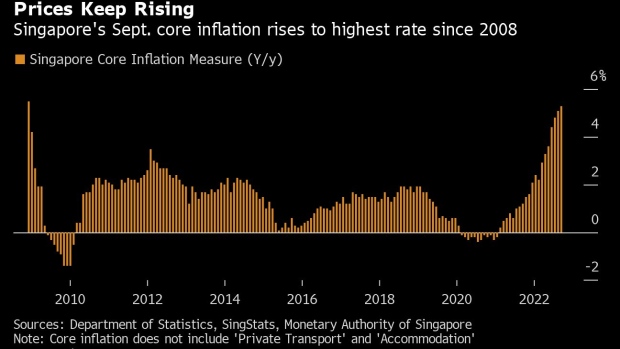Oct 25, 2022
Singapore Core Inflation Quickens for Seventh Month in September
, Bloomberg News

(Bloomberg) -- An inflation measure monitored by Singapore’s central bank accelerated for a seventh straight month in September to a near 14-year high, giving policymakers scope to maintain their tightening bias even after delivering five moves since last October.
Core inflation, which excludes costs of accommodation and private road transport, increased 5.3% from a year ago, the fastest pace since November 2008. The print is up from 5.1% in August and in line with the median estimate in a Bloomberg survey of economists. Headline inflation of 7.5% matched the pace in August, as well as the median expectations.
Costs of everyday items like dining at hawker centers, flour, chilled poultry and children’s clothing saw their highest ever year-on-year increases in September, according to data from the Department of Statistics.
While two of Southeast Asia’s six-biggest economies, Malaysia and Thailand, have recently seen a deceleration in headline inflation, Singapore is still awaiting a peak with policymakers warning of persistent price pressures and a darkening outlook for the global economy.
The central bank this month said it expects core inflation to average at 4% this year and the all-items measure at 6%. It reiterated Tuesday that it expects core inflation to stay elevated before slowing in the second half of next year as global price pressures and domestic labor tightness eases.
What Bloomberg Economics Says...
Headline “inflation stabilizing in September may be only a temporary respite from the steady increases in the gauge. Demand-pull price pressures remain, underpinned by reopening and house price gains. This has boosted wages and strengthened household balance sheets.”
--Tamara Henderson, Asean economist
For the full note, click here
Rising costs of living prompted Singapore’s government to roll out further support measures this month. The finance ministry announced a new S$1.5 billion ($1.05 billion) plan to support lower- and middle-income households by way of cash handouts, vouchers and transport subsidies.
(Updates with size and scope, Bloomberg economist comments)
©2022 Bloomberg L.P.






